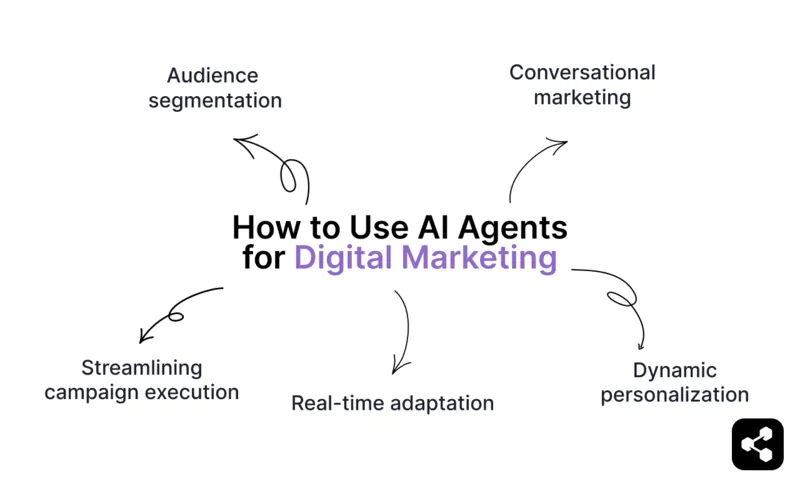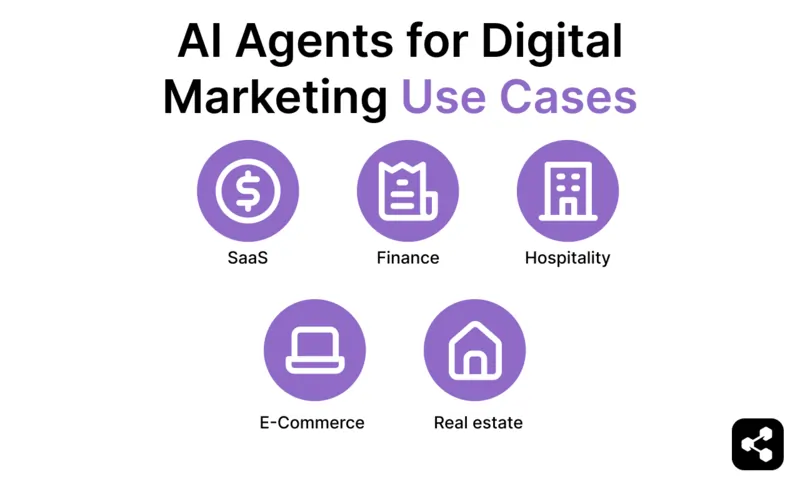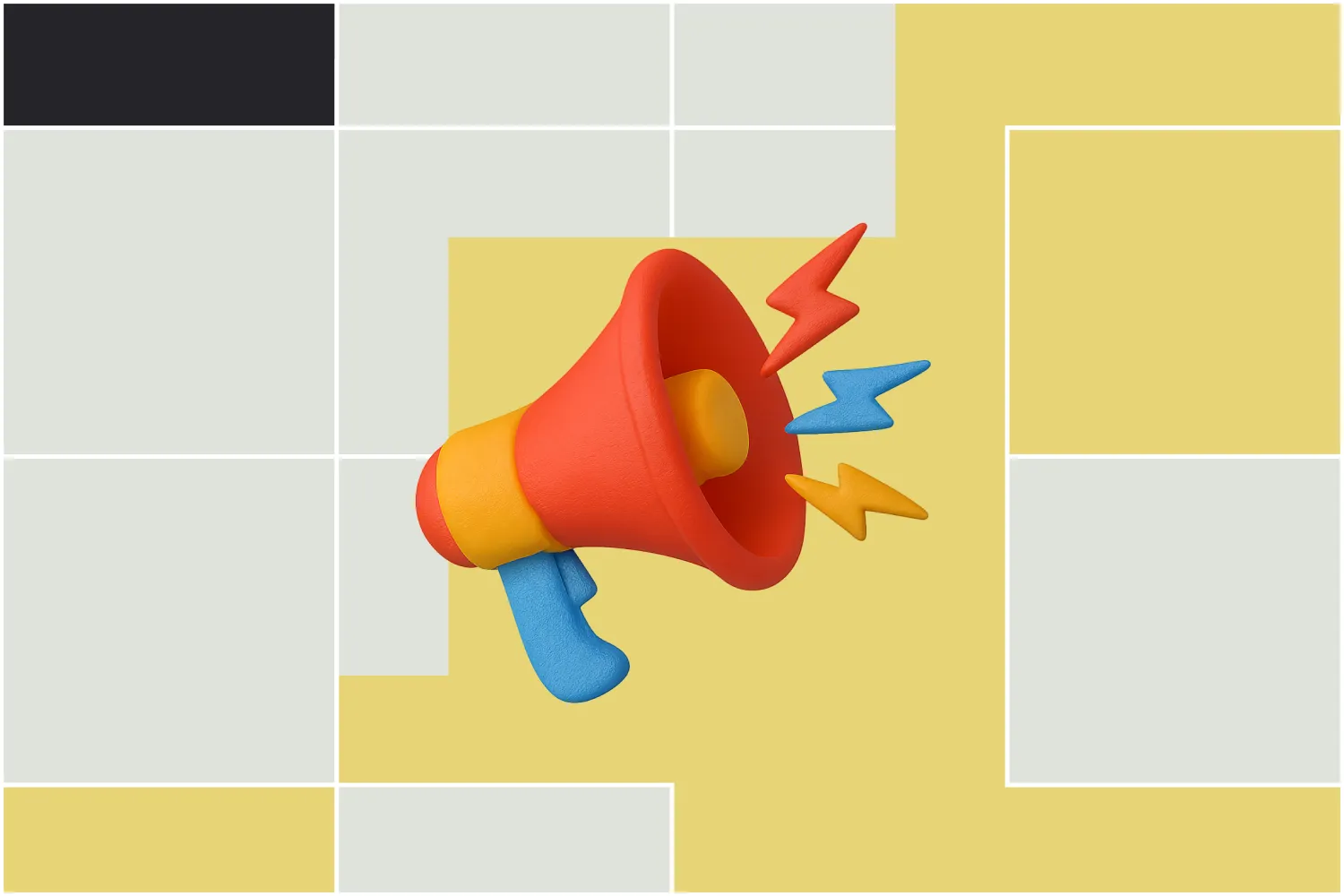- AI in marketing analyzes data to engage customers instantly,and deliver personalized experiences with less manual effort.
- AI can identify niche customer segments in real time.
- They streamline marketing by automating tasks such as email scheduling and social posting for better efficiency.
- Personalized experiences are crafted by AI through tailored emails, landing pages, and recommendations matching individual user needs.
Digital marketing used to be like going on a road trip with just a paper map.
It was fun, but it required a lot of manual effort, guesswork, and there were a few hiccups along the way. You’d research keywords, schedule posts, and track performance manually, hoping to hit the right audience at the right time.
Enter AI agents, and it’s like suddenly upgrading to a GPS that plots the fastest route, predicts traffic, and even suggests scenic detours.
With digital marketing AI agents, campaigns learn, adapt, and optimize themselves in real-time, transforming marketing from a manual journey into a dynamic, data-driven adventure.
Just as digital maps revolutionized road trips, AI agents are redefining digital marketing.
What is AI in digital marketing?
AI in digital marketing is the use of AI to analyze data and optimize marketing strategies. It helps businesses understand customer behaviour and deliver personalized experiences with minimal manual effort.
It leverages conversational AI to engage customers instantly and refine targeting based on interactions.
Imagine running an ad campaign for a new skincare product. Traditional marketing might involve manually identifying target demographics using limited, static data. This requires significant time and effort, relying on surveys and other labour-intensive methods to gather insights. These insights can quickly become outdated as customer preferences evolve, making it challenging to keep campaigns relevant and effective.
AI, however, takes this targeting to an entirely new level by analyzing vast amounts of data in real time. It identifies niche segments, such as users specifically searching for ‘natural anti-aging creams,’ and delivers personalized ads. This ensures precision targeting, keeping campaigns dynamic and aligned with evolving customer behaviours.
How to Use AI Agents for Digital Marketing

1. Audience segmentation and targeting
By analyzing customer data from multiple sources, AI agents identify detailed audience segments based on traits, preferences, and behaviours.
This enables marketers to deliver campaigns that resonate deeply with specific customer groups, ensuring content reaches the right people at the right time.
A SaaS company offering a new project management tool could use AI agents to analyze customer data from various sources, including website behaviour, social media engagement, and CRM data.
These insights help the company identify distinct audience segments: startups looking for scalable tools and corporate teams focused on integration capabilities.
Campaigns are then customized for each group. For example, startups are shown ads emphasizing affordability, while corporate teams see messaging about seamless integrations.
2. Streamlining campaign execution
AI agents, including AI sales agents, streamline the execution of marketing campaigns by automating tasks like email scheduling, ad placement, and social media posting. They can even adjust the timing and messaging of these campaigns to optimize engagement.
AI agents could then automate marketing tasks to execute campaigns efficiently:
- Email scheduling: Sends welcome emails with personalized onboarding guides based on the segment.
- Ad placement: Runs Google Ads targeting keywords like “best project management software for startups” and allocates budget dynamically based on performance.
- Social media posting: Schedules posts showcasing features relevant to freelancers during peak engagement hours.
3. Real-time adaptation
One of the standout features of AI agents is their ability to optimize campaigns in real time. Leveraging multi-agent systems (MAS), these AI agents collaborate to analyze performance data and implement adjustments more efficiently, enhancing the overall effectiveness of the marketing strategy.
If an ad isn’t performing well, the AI can tweak the content, adjust the audience, or shift the budget to higher-performing channels.
As the SaaS’ campaign progresses, AI agents could monitor results and adapt dynamically. For example:
- If an ad targeting startups underperforms, the AI tweaks the headline to emphasize cost-effectiveness or reallocates the budget to better-performing segments.
- AI identifies that freelancers engage more with video content and shifts resources to produce short videos highlighting task tracking.
4. Dynamic personalization
Using insights gained from customer interactions, AI agents craft personalized recommendations, emails, and ads tailored to individual needs.
Using data from customer interactions, the AI personalizes touchpoints:
- Emails: Freelancers receive recommendations for individual productivity features, while corporate teams see case studies of large organizations using the software.
- Landing pages: Visitors from an ad for startups are greeted with a page showcasing scalability and pricing plans suited to growing businesses.
5. Conversational marketing
One powerful application of AI in digital marketing is conversational marketing, which uses tools like AI chatbots, voice agents, and messaging platforms to create real-time, personalized interactions with customers.
- Real-time support: AI chatbots and voice agents engage in conversations, answering questions and guiding customers.
- Tailored experiences:some text
- Startups are guided toward free trials focused on team collaboration.
- Freelancers receive instant answers about pricing.
- Corporate teams are offered options to schedule a demo.
What industries are using AI agents for digital marketing?

Although AI agents are used for digital marketing in countless industries, here’s how they are making an impact in some of the most popular ones.
Real estate
AI digital marketing tools, such as AI chatbots for real estate, streamline how agents connect with buyers by creating hyper-targeted campaigns and automating outreach. These tools:
- Analyze customer data to generate tailored content.
- Craft personalized email campaigns based on this data, ensuring that clients receive information aligned with their property interests.
- Qualify leads through conversational outreach and boosting social media engagement.
Let’s say a young couple is searching online for properties in a specific suburb. They might then start to see Instagram ads highlighting newly listed homes in that area, complete with virtual tour links.
Finance
AI agents in financial marketing use data to craft campaigns that make complex services feel approachable and relatable.
Finance chatbots are game-changers in digital marketing by engaging customers with personalized recommendations, answering queries in real time, and driving conversions through tailored campaigns.
Someone exploring cryptocurrency might see a YouTube ad on “Crypto Investing 101,” with AI following up through tailored newsletters and tools like ROI calculators to build trust.
SaaS
In the SaaS industry, AI enhances digital marketing by identifying user intent and tailoring outreach strategies for maximum impact. AI tools enable businesses to:
- Segment audiences based on behaviour, like interest in features or pricing.
- Create dynamic and personalized ad campaigns on platforms like Facebook.
- Automate email workflows to deliver timely follow-ups, like demo invitations or free trial extensions, based on user engagement.
Consider a mid-sized company exploring CRM tools. AI agents identify their interest based on time spent reading blog posts about team collaboration. This triggers Facebook ads showcasing the SaaS platform's features and follows up with a personalized webinar invitation.
E-commerce
AI is redefining online retail with highly targeted and personalized marketing strategies. Conversational AI for e-commerce enables real-time product recommendations tailored to individual preferences.
So, a customer exploring eco-friendly home goods might see a Facebook ad for sustainable kitchenware after visiting the brand’s blog on green living. Later, they receive an email showcasing products that align with their eco-conscious values, like reusable straws.
Hospitality
AI tools, including chatbots for hotels, are transforming digital marketing by creating highly personalized customer journeys.
- A solo traveler searching for adventure packages might see Instagram ads showcasing guided hiking tours tailored to their preferences.
- Hotel chatbots can directly engage travelers, answer queries, recommend tailored options, and offer exclusive discounts to encourage bookings.
Top 7 Tools in AI Digital Marketing
1. Botpress

Botpress is a powerful, flexible platform for building AI-powered digital marketing agents and LLM-driven solutions. Designed for developers and marketers, it combines adaptability with advanced features like natural language understanding (NLU), multilingual capabilities, and omnichannel support.
With Botpress, users can create customizable and scalable AI agents tailored for lead generation, campaign automation, and personalized customer engagement. These agents integrate seamlessly with CRMs, email marketing tools, and analytics platforms, making them an ideal choice for businesses aiming to optimize their digital marketing efforts.
Key features
- Advanced conversational AI powered by NLU and LLM technology.
- Multilingual and omnichannel capabilities to reach diverse audiences.
- Customizable workflows for applications across sales and customer engagement.
- Integration with CRMs, marketing platforms, and other tools for seamless operations.
Pros
- Highly flexible and developer-friendly for tailored solutions.
- Scales well to meet the needs of both small and large businesses.
Cons
- Prebuilt integrations for certain tools may be limited, requiring additional configuration in specific cases.
2. Drift

Drift, acquired by Salesloft in February 2024, is a conversational marketing platform that specializes in helping businesses connect with prospects in real time.
Drift's AI chatbots specialize in lead qualification, automating meeting scheduling, and personalizing conversations.
Key features
- Real-time conversational marketing capabilities
- AI-driven lead qualification and routing
- Seamless integration with popular CRMs like Salesforce and HubSpot
- Meeting scheduling automation
Pros:
- Strong focus on sales alignment with real-time lead routing.
- Powerful integrations with CRMs like Salesforce and HubSpot.
- Easy-to-use interface with advanced chatbot capabilities.
Cons:
- Pricing can be high for smaller businesses.
- Features are heavily sales-focused, limiting broader use cases.
3. Intercom

Intercom is a customer communication platform that combines AI chatbots with messaging tools to help businesses connect with their customers effectively. Intercom excels at automating customer support, onboarding new users, and qualifying leads.
Its chatbots work alongside live chat to provide personalized assistance in real time.
Key features
- Proactive messaging for personalized customer engagement
- AI chatbots integrated with live chat support
- In-depth user analytics for better targeting
- Wide integration options with existing tools
Pros:
- Intuitive design for both businesses and users.
- Excellent proactive messaging for personalized engagement.
- Comprehensive integration options with existing tools.
Cons:
- Expensive for growing companies with large customer bases.
- Limited flexibility for creating highly customized workflows.
4. Ada

Ada is a no-code chatbot platform designed for businesses seeking to automate customer interactions at scale.
Ideal for customer support, Ada’s AI-driven bots handle routine inquiries, guide users through troubleshooting, and personalize interactions based on customer behaviour.
Key features
- No-code builder for easy chatbot creation
- Multilingual capabilities for global audience reach
- Personalization features driven by customer behavior
- Seamless CRM and data source integration
Pros:
- User-friendly, no technical expertise needed.
- Multilingual capabilities for global reach.
- Seamless integration with CRM tools and data sources.
Cons:
- Primarily focused on customer support, with fewer marketing features.
- Limited customization compared to open-source options.
5. Tars

Tars is a chatbot platform that focuses on creating conversational landing pages to boost lead generation and conversions. Perfect for businesses running PPC campaigns, Tars replaces traditional forms with interactive chatbots that engage users, collect information, and guide them toward completing actions.
Its intuitive interface and robust analytics help businesses optimize their campaigns for maximum ROI.
Key features
- Conversational landing pages for lead generation
- PPC campaign optimization with chatbot integration
- Intuitive setup and robust analytics
- Prebuilt templates for quick deployment
Pros:
- Excellent for PPC campaign optimization.
- Simplifies user interactions, leading to higher conversions.
- Intuitive interface for quick setup.
Cons:
- Limited to specific use cases like lead generation and landing pages.
- Not as robust for long-term customer engagement.
6. ManyChat

ManyChat is a chatbot builder specializing in automating interactions on social media platforms like Facebook Messenger, Instagram, and WhatsApp. Designed for marketers and small businesses, ManyChat simplifies lead generation, customer engagement, and follow-ups with its easy-to-use drag-and-drop interface.
By connecting with e-commerce tools and CRMs, ManyChat helps businesses drive sales and build relationships through interactive, conversational marketing.
Key features
- Automation for social media marketing on multiple platforms
- Drag-and-drop interface for simple chatbot creation
- Integration with e-commerce tools and CRMs
- Support for interactive, conversational marketing campaigns
Pros:
- Affordable pricing for small businesses.
- Highly effective for social media marketing automation.
- Easy-to-use drag-and-drop builder.
Cons:
- Limited applications beyond social media.
- Reliance on platform APIs means potential disruption during updates.
Elevate your Digital Marketing Effort with AI
These days, digital marketing campaigns strongly benefit from leveraging AI to optimize strategies, personalize customer experiences, and drive meaningful engagement.
It’s like upgrading to a GPS after using a paper map your whole life.
Ready to transform your digital marketing? Botpress provides you with the tools you need to build custom AI solutions, including advanced chatbots and intelligent automation.
Start building today. It’s free.
FAQs
1. What types of data do AI agents need to perform effectively?
AI agents need access to structured data (like CRM records and web analytics) and unstructured data (like chat transcripts and social media interactions) to perform effectively. The more relevant and diverse the data, the better the agent can personalize messaging and automate workflows.
2. How secure is the data that AI agents analyze in marketing contexts?
The data that AI agents analyze in marketing contexts is secured with encryption protocols and compliance standards like GDPR, CCPA, and SOC 2. However, the actual level of security depends on how the business configures its data policies and whether third-party tools are vetted properly.
3. How do AI agents differ from machine learning models in marketing?
AI agents differ from machine learning models in that AI agents not only analyze data but also make real-time decisions and manage workflows autonomously. Machine learning models generate insights and predictions, but AI agents use those outputs to actively execute marketing strategies.
4. Can AI agents be integrated with existing MarTech stacks (like HubSpot, Mailchimp, etc.)?
Yes, AI agents can be integrated with existing MarTech stacks like HubSpot, Mailchimp, Salesforce, and others through built-in integrations or custom API connectors. This allows them to automate follow-ups and unify customer insights across platforms.
5. What are the challenges in integrating AI agents with CRM and analytics tools?
The main challenges in integrating AI agents with CRM and analytics tools include differences in data schemas, limited API access, syncing issues, and aligning AI behavior with business-specific rules. Overcoming these challenges requires technical configuration and ongoing monitoring to ensure the AI functions reliably.





.webp)

